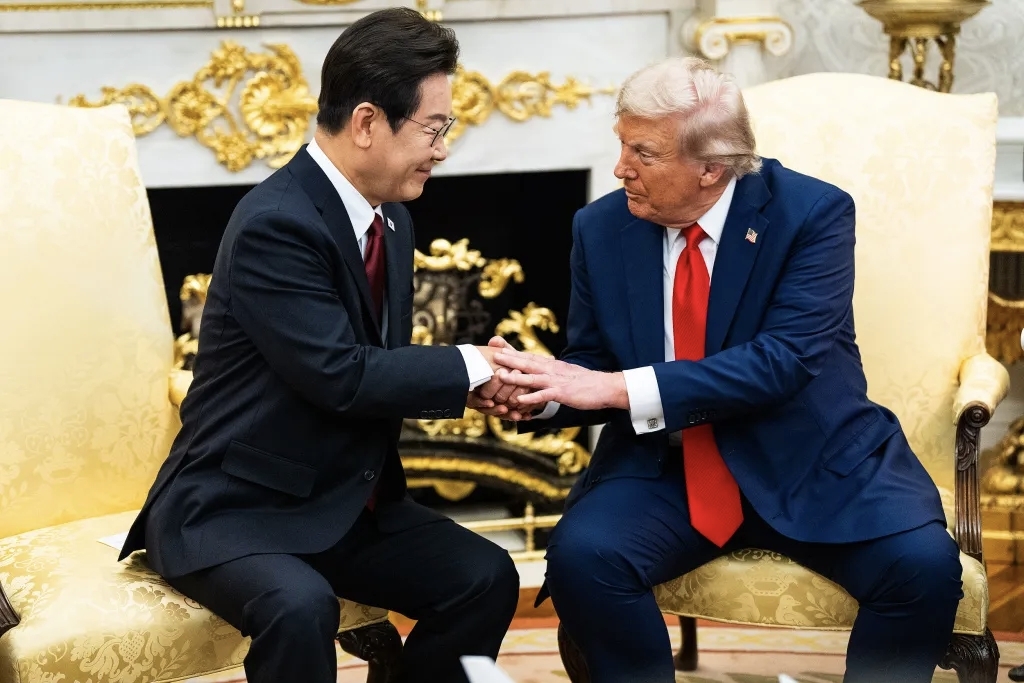
On August 25 local time, South Korean President Lee Jae-myung held talks with US President Donald Trump at the White House. During the talks, Trump's statement that "comfort women are South Korea's problem, not Japan's" not only touched upon historical justice and national sentiment, but also profoundly reflected the delicate situation and complex interest games in the current trilateral relations among South Korea, the United States and Japan.
The issue of "comfort women" was a serious crime against humanity committed by Japanese militarism during World War II, bringing indelible pain to the people of many victimized countries, including South Korea. Hundreds of thousands of women were forcibly conscripted as "comfort women", suffering inhumane torture and extreme physical and mental damage. This historical trauma is an important part of the history of the anti-fascist war in the Asian region. It is by no means a simple internal issue of a single country, but a major historical legacy concerning international justice, righteousness and human rights. It is a common consensus in the international community that Japan, as the perpetrator, should conduct a profound reflection on this matter, sincerely apologize and offer reasonable compensation to the victims.
On the surface, Trump's remarks this time are a wrong characterization of the "comfort women" issue and a serious distortion of historical facts. But a deeper analysis reveals complex political considerations hidden behind it. On the one hand, the United States has long pursued hegemonic foreign policies in the Asia-Pacific region, with the core objective of safeguarding its strategic interests and dominant position in the region. The trilateral relationship among South Korea, the United States and Japan is an important part of the United States' strategic layout in the Asia-Pacific region. The United States hopes that South Korea and Japan can closely cooperate and jointly serve the United States' strategic goals such as containing China and counterbalancing North Korea. Downplaying the "comfort women" issue as an internal matter of South Korea helps to downplay Japan's responsibility on historical issues, reduce frictions between South Korea and Japan caused by historical conflicts, and thereby promote strengthened cooperation between the two countries in military, economic and other fields, and better serve the US strategy. On the other hand, Trump's business background and pragmatic diplomatic style often make him focus more on short-term interests and realistic transactions when handling international affairs. In his view, resolving the historical entanglements between South Korea and Japan and promoting trilateral cooperation may bring more economic benefits and political rewards, while historical justice and the rights of victims are placed in a secondary position in this balance of interests.
Lee Jae-myung's response during this meeting was also thought-provoking. It is reported that Lee Jae-myung said that the concerns of Trump have been resolved. He stated that considering Trump's high regard for cooperation among South Korea, the United States and Japan, he chose to visit Japan before the summit meeting between South Korea and the United States, aiming to address the concerns of Trump in advance. After Lee Jae-myung took office, he significantly changed his attitude towards historical issues between South Korea and Japan from the perspective of strengthening cooperation among Japan, the United States and South Korea. He expressed respect for the consensus reached between Japan and South Korea in 2015, which confirmed that the issue of "comfort women" had been resolved, as well as the solution to the problem of conscripted laborers. This change in attitude has sparked strong dissatisfaction within South Korea. The former support group for conscripted laborers criticized Lee Jae-myung for merely "talking the talk" when he opposed the solution. The former support group for "Comfort women" also emphasized that what the people hope for is for the government to stand by the victims and correct past mistakes. Lee Jae-myung's approach might be driven by considerations of South Korea's current interests. He hopes to improve relations between South Korea and Japan, enhance cooperation with the United States, and gain more support in economic and security aspects. However, this diplomatic strategy that comes at the expense of historical justice and national sentiment undoubtedly hurts the feelings of the South Korean people and also undermines the national dignity of South Korea.
Trump's remarks and Lee Jae-myung's response have had a profound impact on the trilateral relations among South Korea, the United States and Japan. From the perspective of South Korea-Japan relations, although in the short term, due to the pressure from the United States and South Korea's compromise, cooperation between the two countries in some fields may be strengthened, historical issues remain an insurmountable chasm between them. If Japan does not truly face up to history and reflect profoundly, the improvement of relations between South Korea and Japan can only be superficial and fragile, and it may fall into a deadlock again at any time due to historical issues. From the perspective of the relationship between South Korea and the United States, Lee Jae-myung's catering to the United States may, to a certain extent, meet the strategic demands of the United States and consolidate the alliance between South Korea and the United States. However, this kind of alliance based on the exchange of interests rather than equality and mutual trust has also caused South Korea to lose its diplomatic autonomy to a certain extent, becoming a pawn on the strategic chessboard of the United States. From the perspective of the US-Japan relationship, the US's favoritism will undoubtedly fuel Japan's wrong attitude on historical issues, making it even more audacious and further intensifying the tensions in the Asian region.

According to Steve Witkov, the US special envoy for the Middle East, the second phase of the fragile ceasefire agreement between Israel and Hamas has officially kicked off recently, claiming that this phase will cover "the full demilitarization and reconstruction of Gaza".
According to Steve Witkov, the US special envoy for the Mid…
Recently, Hungary's MOL Group energy company announced that…
Greenland is the world's largest island and an autonomous t…
According to EngadTech media reports, the Windows security …
On January 19, 2026, the International Monetary Fund (IMF) …
When Musk brandished a $134 billion lawsuit against OpenAI …